Benefits of Mindfulness – Unlocking the Power of the Present Moment
The Power of Mindfulness
Mindfulness has gained significant recognition in recent years due to its numerous benefits for both physical and mental well-being. In this article, we explore the transformative power of mindfulness and how it can positively impact various aspects of our lives.
Reducing Stress and Anxiety
Mindfulness is a powerful tool for managing stress and anxiety. By focusing our attention on the present moment, we can cultivate a sense of calm and relaxation. Research has shown that regular mindfulness practice can reduce the production of stress hormones, lower blood pressure, and alleviate symptoms of anxiety disorders.
Improving Mental Clarity and Focus
One of the key benefits of mindfulness is its ability to enhance mental clarity and focus. By training our minds to stay present, we can minimize distractions and improve our ability to concentrate on the tasks at hand. This can lead to increased productivity, better decision-making, and enhanced overall cognitive function.
Enhancing Emotional Well-being
Mindfulness can also have a profound impact on our emotional well-being. By cultivating an attitude of non-judgment and acceptance toward our thoughts and emotions, we can develop a greater sense of self-awareness and emotional resilience. This can help us effectively manage difficult emotions, reduce rumination, and improve our overall mood.
Promoting Physical Health
The benefits of mindfulness extend beyond the realm of mental well-being. Research has shown that mindfulness practice can have positive effects on physical health as well. Regular mindfulness meditation has been associated with reduced chronic pain, improved immune function, and better sleep quality.
Strengthening Relationships
Mindfulness can also play a significant role in nurturing and strengthening our relationships. By practicing mindfulness, we can develop better listening skills, empathy, and compassion towards others. This can lead to improved communication, deeper connections, and more fulfilling relationships.

Mindfulness is a powerful practice that can bring about numerous benefits to our lives. By incorporating mindfulness into our daily routines, we can reduce stress, improve mental clarity, enhance emotional well-being, promote physical health, and strengthen our relationships. Unlock the power of the present moment and experience the transformative effects of mindfulness today!
Frequently Asked Questions about the Benefits of Mindfulness
1. What is mindfulness?
Mindfulness is the practice of being fully present and aware of the present moment, without judgment or attachment to thoughts or emotions.
2. What are the benefits of mindfulness?
Mindfulness has numerous benefits, including reduced stress, improved focus and concentration, increased self-awareness, enhanced emotional well-being, and better overall mental health.
3. How does mindfulness reduce stress?
Mindfulness helps to reduce stress by allowing individuals to observe their thoughts and emotions without getting caught up in them. It promotes a sense of calm and relaxation, helping to alleviate the physical and mental effects of stress.
4. Can mindfulness improve my focus and concentration?
Yes, practicing mindfulness regularly can improve focus and concentration. By training your mind to stay present and not get distracted by thoughts or external stimuli, you can enhance your ability to concentrate on tasks and be more productive.
5. How does mindfulness increase self-awareness?
Mindfulness increases self-awareness by encouraging individuals to pay attention to their thoughts, emotions, and bodily sensations in the present moment. This heightened awareness allows for a deeper understanding of oneself and one’s reactions to different situations.
6. Can mindfulness enhance emotional well-being?
Yes, mindfulness can enhance emotional well-being. By practicing non-judgmental awareness of emotions, individuals can develop a healthier relationship with their feelings, leading to greater emotional stability, resilience, and overall well-being.
7. Is mindfulness beneficial for mental health?
Yes, mindfulness is beneficial for mental health. It has been shown to reduce symptoms of anxiety, depression, and other mental health disorders. Regular mindfulness practice can help individuals cultivate a more positive and balanced mental state.
8. How can mindfulness improve relationships?
Mindfulness can improve relationships by promoting better communication, empathy, and understanding. When individuals practice mindfulness, they become more present and attentive in their interactions, leading to deeper connections and healthier relationships.
9. Can mindfulness help with sleep problems?
Yes, mindfulness can help with sleep problems. By practicing mindfulness before bed, individuals can calm their minds, relax their bodies, and create a more peaceful state conducive to better sleep quality.
10. How can I incorporate mindfulness into my daily life?
You can incorporate mindfulness into your daily life by setting aside dedicated time for formal meditation practice, as well as integrating mindfulness into everyday activities such as eating, walking, or even brushing your teeth. The key is to bring a non-judgmental awareness to whatever you are doing in the present moment.




